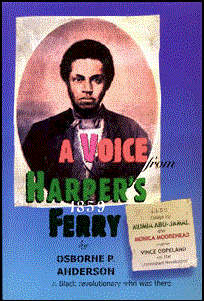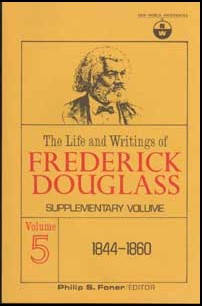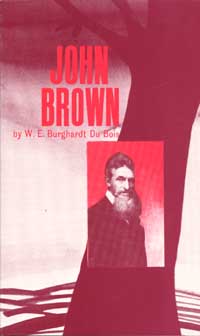“Without struggle there is no progress.”
— Frederick Douglass
Slavery in the modern era
Disposable People: New Slavery in the Global Economy
by Kevin Bales
University of California Press, 1999; ISBN 0-520217-97-7
http://www.wsws.org/articles/1999/sep1999/slav-s09.shtml
“There are ‘more slaves alive today than all the people stolen from Africa in the time of the transatlantic slave trade,’ writes Kevin Bales. He estimates there are more than 27 million people ‘enslaved by violence and held against their wills for purposes of exploitation’ and the number is increasing.” ...
“As many as 50,000 Thai women work as prostitutes in Japan. Many work as exotic dancers and bar girls in Europe and the US. One brothel owner in New York City testified she had paid $6,000-$15,000 for the 30 Thai women imprisoned in her brothel.”
Leaked CIA report says 50,000 people sold into slavery in US every year
http://www.wsws.org/articles/2000/apr2000/slav-a03.shtml
“A Central Intelligence Agency report leaked to the New York Times describes a flourishing trade in slave labor that brings some 50,000 women and children into the United States every year to serve as prostitutes, domestic servants or bonded workers. The report estimates that the number of slave laborers imported into the US from around the world has grown rapidly over the past decade, and predicts their ranks will continue to increase.”
Narrative of the Life of Frederick Douglass,
An American Slave
Written By Himself
Published at the Anti-Slavery Office, Boston, 1845
ftp://ibiblio.org/pub/docs/books/gutenberg/etext92/duglas11.txt
(Note: This is a free online book from Project Gutenberg. It’s not a web page, but a large FTP text file, about 248K. You can still read it in your browser, though. There’s a lot of preliminary text before the actual narrative finally begins.)
Frederick Douglass was a great man, an eloquent speaker and a very good writer. His description of the demonic sadism of slave-owners and overseers does not mince words. His writing is essential for understanding the revolting, evil side of America’s bloody history.
War At Home:
Covert Action Against U.S. Activists and What We Can Do About It
by Brian Glick
published by South End Press
This valuable book provides a history of the FBI’s infamous COINTELPRO operations. These were used to murder, beat, intimidate, harass, confuse, fragment, destroy and silence political dissent by all leftist activists. These ILLEGAL FBI operations took place in the 1960s and ’70s against any Black, Puerto Rican, Indian or White person/group courageous enough to oppose U.S. government-military evil doing. The FBI is inherently a White-racist organization, however, and COINTELPRO operations were generally more violent and ruthless against the Black Panthers and other Black or Indian activists than they were against people of other races.
Today’s FBI persists in the murder and intimidation of Americans of all races, of course, but not under the same codename of “COINTELPRO.”
War at Home also gives practical tips on how to deal with today’s U.S. Corporate Mafia Government thugs. Basically the more unity and publicity the better. Like the criminal bullies they truly are, the FBI and the pigs hate and fear the public exposure of their crimes by a unified opposition. Their basic strategy is to divide and conquer.
The book includes a checklist of essential precautions, information on your legal rights and defenses against the psychological warfare which the American Gestapo (FBI) uses to harass people who have moral consciences and political consciousness.
More about War At Home
Martin Luther King, Jr: The FBI File
by Michael Friedly with D. Gallen
published by: Carroll & Graf
Extracts from the corrupt FBI’s own memoranda, field reports, confidential correspondence and illegal wiretaps. These bring to light the sinister nature of the infamous J. Edgar Hoover’s futile attempt to frame King as a Communist.
See also:
THE MARTIN LUTHER KING YOU DON’T SEE ON TV
http://www.uvm.edu/~wmiller/faironmlk.htm
“Beyond Vietnam”
http://www.uvm.edu/~wmiller/mlkbeyondvietnam.htmA speech by Dr. Martin Luther King, Jr., given at the Riverside Church, New York City, on April 4, 1967.
The Martin Luther King, Jr. Papers Project
http://www.stanford.edu/group/King/
Who Killed Martin Luther King?
http://www.douglasvalentine.com/articles.html#king“On Dec. 8, a jury in Memphis, Tenn., deliberated for only three hours before deciding that the long-held official version of Martin Luther King Jr.’s assassination was wrong.
“The jury’s verdict implicated a retired Memphis businessman and government agencies in a conspiracy to kill the civil rights giant.”
Panther: A Pictorial History of the Black Panthers and the Story Behind the Film
by Mario Van Peebles et al.
published by: Newmarket
Provides an intensive background to the militant and passionate Black Panther civil rights movement. The book is drawn from interviews with original participants and newly declassified government documents, and includes the story behind the film.
My Bondage and My Freedom
by Frederick Douglass
published by: Dover
Considered the best of his autobiographies, this book graphically describes the inhuman treatment of slaves, its effect on slave owners and slave families, and how Douglass’ determination led him to a new life.
 A Voice from Harper’s Ferry
A Voice from Harper’s Ferry
by Osborne P. Anderson
A Black revolutionary who was there
published by: World View Forum, 2000; ISBN 0-89567-136-0
From Leftbooks.com:
A unique book about the raid on Harper’s Ferry. Few History books give Osborne P. Anderson the recognition he deserves.
Anderson was the only Black combatant to survive the raid and to write about it. His account of this turning point in the struggle against slavery — an armed attack by Black and White volunteers on a citadel of the South — refutes those who try to minimize the role of African American people in fighting for their freedom.
Imprisoned Black journalist Mumia Abu-Jamal contributed one of the forwards. Contributors include Monica Moorehead and Vince Copeland.
 The Life & Writings of Frederick Douglass
The Life & Writings of Frederick Douglass
Vol. 5 1844-1860
by Frederick Douglass
Edited by Phillip S. Froner
International Publishers, 1975; ISBN 0-7178-0454-4
“The Life and Writings of Frederick Douglass puts all America under deep obligation. The figure of a great man rises from these volumes.”
— Dr. W.E.B. DuBois
From Leftbooks.com:
From his own letters, speeches, interviews and essays a picture of the man and the period emerges from the pages of this book. On the eve of the most significant war ever fought by the United States the battle over the future of the hated system of chattel slavery is explored, debated and explained with the passion and intelligence of one of the most important figures in U.S. history.
History comes alive when you read this book. A great gift for young readers wondering what the roots of racism are all about.
 John Brown
John Brown
by W.E.B. Du Bois
International Publishers; ISDN 0-7178-0375-9
From Leftbooks.com:
On October 16, 1859, John Brown and a group of 22 men launched a courageous attack on the federal armory at Harper’s Ferry, West Virginia to obtain weapons and arm the slaves, and through mass revolt end slavery. Though Brown and his men were defeated by U.S. Marines two days later, their bravery touched the hearts of many slaves and Abolitionists.
Du Bois rose to a passionate and fully documented support of John Brown against all his detractors, developing the view that at Harper’s Ferry, John Brown fought the first battle of the Civil War. Du Bois offers a profound picture of John Brown the man, father, religionist, and irrepressible crusader against the sacrilege of slavery.
The author conveys to the reader the wrath and turbulence of John Brown, yet depicts his care and deliberation in the anti-slavery battle. With keen perception, there is revealed both the unity and conflict of John Brown’s relation with Frederick Douglass, William Lloyd Garrison and other Abolitionists.
In the words of Du Bois, “This book is at once a record of and a tribute to the man who of all Americans has perhaps come nearest to touching the real souls of black folk.”
Narrative of Sojourner Truth
by Sojourner Truth
Dover Publications
Inspiring memoir by the famous African-American abolitionist and champion of women’s rights.
Incidents in the Life of a Slave Girl
by Harriet Jacobs
Dover Publications
Published in 1861, this is one of few existing slave narratives written by a woman. A powerful portrayal of slavery’s brutality, and an inspiring account of an unvanquished human spirit.
Voices From Slavery:
100 Authentic Slave Narratives
Norman R. Yetman (ed.)
Dover Publications
Vivid descriptions of “good” masters (is there such a thing?) and bad ones, the horrors of slave auctions and many other unforgettable details of slave life. Includes 32 photographs.
Up From Slavery
by Booker T. Washington
Dover Publications
Booker T. Washington was a former slave who became a major figure in the struggle for equal rights. This is his autobiography.
The Souls of Black Folk
by W.E.B. DuBois
Dover Publications
DuBois argues that it is wrong to beg for those rights that belong inherently to all mankind and that accommodation to White supremacy only serves to perpetuate Black oppression.
The Suppression of the African Slave-Trade to the United States of America, 1638-1870
by W.E.B. DuBois
Dover Publications
This well-documented classic examines the South’s plantation economy and its influence on the slave trade, the role of Northern merchants in financing the slave trade and much else.
Slave Ships and Slaving
by George Francis Shaw
Dover Publications
Extraordinary collection of commentaries by ships’ doctors and captains, as well as written testimonies for a parliamentary committee investigating the slave trade. Accounts, varying from sympathetic to indifferent, relate horrifying events and conditions — the holding pens or “factories”, living conditions aboard ships, mutinies and their suppression, and more. Includes 54 period engravings and other illustrations to accompany the grim record. This book is an unabridged reprint of the classic 1927 edition.
The Story of the Amistad
by Emma Gelders Stern
Dover Publications
Especially for young readers, this is a gripping tale of the epic 1839 slave revolt aboard the schooner Amistad. Africans bound for slavery in “the land of the free” fought against all odds for their freedom, escaping a fate worse than death in the United States of America.
A Social History of the African Negro
by Benjamin Brawley
Dover Publications
This eloquent classic traces the history of Black Americans from precolonial exploration through slavery, rebellion, “emancipation”, and halting social progress.
To Awaken My Afflicted Brethren:
David Walker and the Problem of Antebellum Slave Resistance
by Peter P. Hinks
published by: PaSUP
Powerful new interpretation of the North Carolina free black man who challenged slaves around the world to “rise up and cast of their chains.” Combines social biography with textual analysis.
Twelve Years A Slave
by Solomon Northup
published by: Dover
Born a free man in New York State in 1808, Solomon Northup was kidnapped in Washington, D.C. in 1841. He spent the next 12 horrible years of his life as a slave on a Louisiana cotton plantation.
After regaining his freedom in 1853, Northup published this gripping autobiographical account of his captivity. It is probably the fullest, most realistic picture of the abject horrors that bourgeois people blandly called “the peculiar institution” during the three decades before the Civil War.
Runaway Slaves:
Rebels on the Plantation
by J.H. Franklin & L. Schweninger
Published by: Oxford; ISBN 0-195-08449-7
Groundbreaking analysis of slave resistance and escape, dispelling the popular belief that slaves were pliant and resigned to their role as human chattel. Demonstrates the frequency of escape through an examination of records of the time.
Black Bostonians:
Family Life and Community Struggle in the Antebellum North
by J.O. Horton & L.E. Horton
published by: Holmes & Meier
Comprehensive profile of life and work in Black Boston from the eighteenth century to the eve of the Civil War. Uncovers ways in which fugitive slaves and businessmen, washerwomen and barbers, churchgoers and abolitionists lived, worked and organized for mutual aid, survival and social action.
History of American Slavery
by Duncan Clarke
published by: JG Press
Traces the chronology of the inhuman corporate trading that stole over 14 million human beings from Africa and brought them as slaves to the Americas. Discusses the general social and political climate; includes stories of individuals such as:
Henry “Box” Brown, whose daring escape became a cause celebre for abolitionists
Phillis Wheatley, whose genius earned her national respect as the first African-American poet.
Masterpieces of Negro Eloquence: 1818-1913
Edited by Alice Moore Dunbar
published by: Dover
This collection of speeches by prominent African-American leaders focuses on issues defining the black experience in the 19th and early 20th centuries. 51 selections focus on slavery, emigration to Africa, abolition, the Civil War, Reconstruction, and Jim Crow segregation. Speeches include:
Frederick Douglass — “What to the Slave is the Fourth of July?”
Booker T. Washington — “Atlanta Compromise” address
W.E.B. DuBois — “discourse on training of Negroes for social reform”
Addresses by Fanny Jackson, Rev. W.J. Gaines, Robert Russa Moton and many others.
Remembering Slavery
Edited by Ira Berlin et al.
published by: New Press
A book and cassette package of interviews and transcripts, “Remembering Slavery” includes a selection of original recordings of people who experienced enslavement. Interviews were conducted by Zora Neale Hurston and John Lomax, together with selections read by Clifton Davis, James Earl Jones, and Melba Moore.
Slave Narratives
published by: Library of America
Collects ten works published between 1772 and 1864 that present unflinching portrayals of the cruelty and degradation of slavery while testifying to the African-American struggle for freedom and dignity. Writers include Olauda Equiano, Frederick Douglass, William Wells Brown and Harriet Jacobs.
Like Judgement Day:
The Ruin and Redemption of a Town Called Rosewood
by Michael D’Orso
published by: Putnam
A true story of horrific atrocity — how a Florida town of middle-class, hardworking black people was set upon by rampaging whites in the winter of 1923, completely destroyed, and its inhabitants dispersed forever.
Worse Than Slavery:
Parchman Farm and the Ordeal of Jim Crow Justice
by Dave M. Oshinsky
published by: Free Press
Documents the history of the grandaddy of all Southern prisons — Mississippi’s Parchman State Penitentiary. This hellhole is an immense, isolated plantation where inmates worked cotton fields from the days of “emancipation” to the civil rights era, when it was used to break the spirit of Freedom Riders.
Black Exodus:
The Great Migration from the American South
Edited by Alferdteen Harrison
published by: UPMs
The essays in this book examine the causes that motivated legions of black southerners to leave behind the racist hell of the South in hopes for a better life in the North. Discusses the effect of the exodus upon the land they left, and upon the communities they chose for their new homes.
The Wretched of the Earth
by Franz Fanon
published by: Grove
First published in 1963, this is a classic work of modern revolutionary theory. It concerns the psychology of the colonized peoples and their path to liberation, and examines how violence effects historical change.
Many of these books are available from:
Edward R. Hamilton, Bookseller
http://www.edwardrhamilton.com/
Falls Village, CT 06031-5000
Dover Publications
http://www.doverpublications.com/
31 East 2nd Street
Mineola, New York 11501
Mumia Abu-Jamal: Political Prisoner in America
Genocide of the American Indian Peoples
Bibliography:
Genocide and Oppression of the American Indian Peoples
Bibliography:
White Slavery in America
See also:
Leaked CIA report says 50,000 sold into slavery in US every year
http://www.wsws.org/articles/2000/apr2000/slav-a03.shtml
“A Central Intelligence Agency report leaked to the New York Times describes a flourishing trade in slave labor that brings some 50,000 women and children into the United States every year to serve as prostitutes, domestic servants or bonded workers. The report estimates that the number of slave laborers imported into the US from around the world has grown rapidly over the past decade, and predicts their ranks will continue to increase.”
Colonialism in Africa Today
WSWS : News & Analysis : Africa http://www.wsws.org/sections/category/news/africa.shtml
The World Socialist Web Site provides the latest major news from Africa with a Marxist analysis. Very eye-opening — unlike anything you’ll ever read in the corporate-controlled mass-media. Find out what the United States Corporate Mafia Government (and it’s European partners in crime) are really up to in Africa. Colonial exploitation isn’t finished at all — it just hides its fangs behind its IMF/World Bank mask.
Full-coverage sections include:
- South Africa
- Zimbabwe
- Angola
- Mozambique
- Sierra Leone
- Liberia
- Cote d’Ivoire
- Ghana
- Guinea-Bissau
- Nigeria
- Congo (DRC)
- Rwanda
- Uganda
- Kenya
- Ethiopia and Eritrea
- Sudan
- Egypt
- Niger
- Libya
- Clinton’s 1998 Tour of Africa
- HIV / AIDS Pandemic
- Colonialism in Africa
Clinton “feels the pain” of Africa — and prepares new imperialist crimes
http://www.wsws.org/news/1998/mar1998/afr-m28.shtml
The significance of Leon Trotsky’s thought for Africa today
http://www.wsws.org/articles/2000/oct2000/talb-o28.shtml
“If emancipation of the working classes requires their fraternal concurrence, how are they to fulfill that great mission with a foreign policy in pursuit of criminal designs, playing upon national prejudices, and squandering in piratical wars the people’s blood and treasure?
“It was not the wisdom of the ruling classes, but the heroic resistance to their criminal folly by the working classes of England, that saved the west of Europe from plunging headlong into an infamous crusade for the propagation of slavery on the other side of the Atlantic.”
— Karl Marx
Inaugural address to the First International
October, 1864